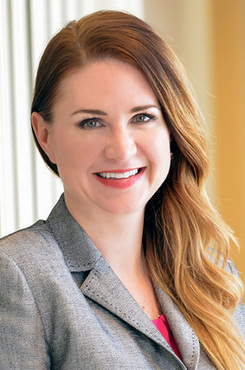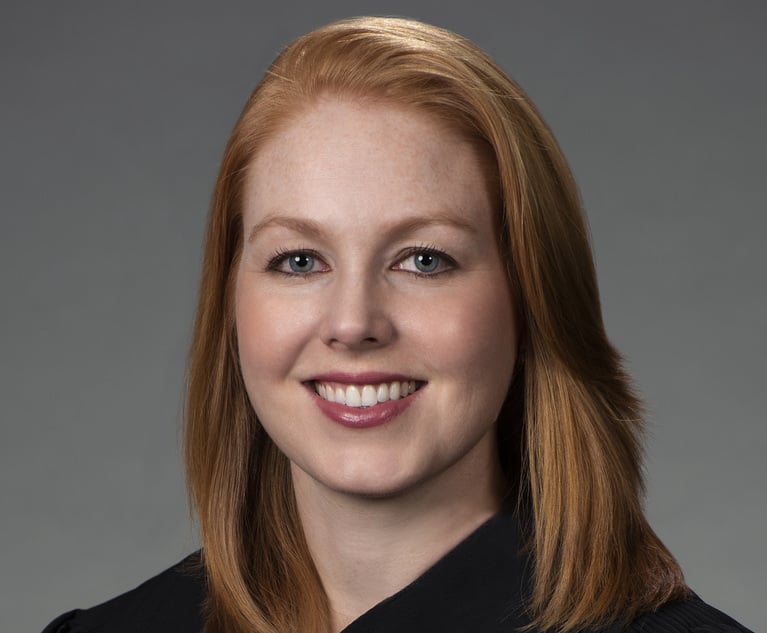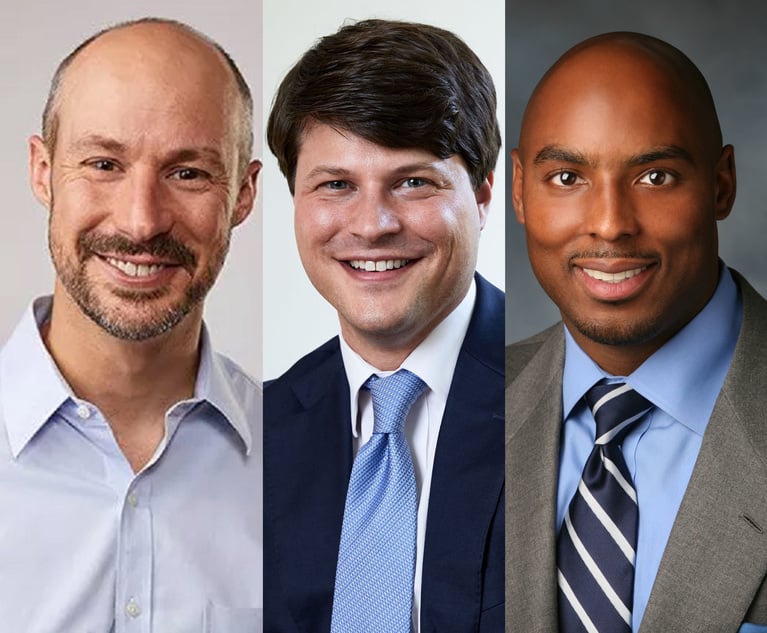Avoiding the Grenades Within 30(b)(6) Depositions of Corporate Representatives
"In the worst case, a corporate representative can even be lulled through clever hypotheticals into making an “admission” that a policy was breached—or worse, that a deviation of the standard of care occurred. "
March 01, 2019 at 02:00 PM
6 minute read
 Lindsay Forlines of Weathington McGrew (Courtesy photo)
Lindsay Forlines of Weathington McGrew (Courtesy photo)Among my colleagues of the medical malpractice defense bar, we increasingly see plaintiffs' lawyers “trying” their case via the 30(b)(6) deposition(s) of the corporate defendant(s), in other words, using these depositions to ask substantive questions that go to the ultimate issues, perhaps in a nonconfrontational, indirect way that can even seem friendly. As such, these depositions are not to be taken lightly. If not properly handled (and prepared for), these depositions can turn into an opportunity for the plaintiff to make the supposed “big bad brick and mortar” defendant look disjointed, evasive or ill-prepared. Obviously, this can be problematic and certainly even more so if the deposition(s) is videotaped. A poorly-worded sound bite from a well-meaning representative can haunt the remainder of litigation and, at the extreme, testimony from these depositions can throw a defensible case off course. In the worst case, a corporate representative can even be lulled through clever hypotheticals into making an “admission” that a policy was breached—or worse, that a deviation of the standard of care occurred. The key to effectively combating and handling these depositions is proper assessment of the designated topics and complete, thorough witness preparation.
Backdrop: The Wording and Purpose of the Statutes
Deposition of organization. A party may, in his or her notice, name as the deponent a public or private corporation … and designate with reasonable particularity the matters on which examination is requested. The organization so named shall designate one or more … persons who consent to testify on its behalf, and may set forth, for each person designated, the matters on which he or she will testify. The persons so designated shall testify as to matters known or reasonably available to the organization.
O.C.G.A. § 9-11-30(b)(6) (and the Federal predecessor, FRCP 30(b)(6), is worded similarly).
It is helpful, when “preparing to prepare” designated witnesses under 30(b)(6) requests, to consider why this “deposition subtype” was created. As stated by the Advisory Committee on the Civil Rules of the U.S. Courts, Rule 30(b)(6) has certain purposes, including assistance to entities facing an unwieldy number of their officers and agents being deposed by parties who are uncertain of who has the relevant knowledge within the corporate organization.
Thus, these depositions were, at least in part, designed to place both the benefit and burden of identifying responsive witnesses on the organization. This streamlines litigation by allowing one witness to testify on a topic for the entire company. The flip side is that the witness needs to be chosen with this end result in mind and thoroughly prepared to comfortably tackle this task.
Keep in mind that the deponent's testimony will represent the knowledge of the entire entity, not just the person being deposed. In other words, this testimony will bind the organization and may be used by the discovering party “for any purpose” (O.C.G.A. §9-11-32(a)(2)). This can even mean that the deposition testimony can be used (if videotaped, played) during the plaintiff's case in chief. In Georgia, a trial court generally has the discretion to rule on this issue.
So What Can In-House Counsel and Risk Managers, in Conjunction with Their Outside Counsel, Do?
- Carefully read the notice of deposition, paying attention to the areas of inquiry. Make sure there has been reasonable particularity in specifying these areas. Counsel can object or ask for further clarification before the deposition(s), if reasonably needed. Arguably, if a question is asked outside the scope of the notice (and outside the areas of inquiry for which the deponent has been designated), the deponent's answers do not speak for the company, but debate exists on how this actually plays out in practice. (For an interesting study on how this can further play out in the medical-malpractice setting, see Robles v. Yugueros, 343 Ga. App. 377 (2017)).
- Once the areas of inquiry are understood, consider the right witness and, often, witnesses—plural. There is no one-size-fits-all answer, of course, and multiple angles must be considered. Many lawyers seem to believe that the question is simply who in the organization is the most knowledgeable on the topic(s) listed in the notice? However, the designated person does not have to be the most knowledgeable, even though some notices are phrased that way. The corporation may put up whoever it deems most suited to be its mouthpiece on the requested topic(s). The rule only requires that the corporate or organizational defendant put up a witness(es) to testify on matters known or readily available to the organization; as such, personal knowledge is not required. Thus, the corporation or organization may select a witness with other factors in mind, such as: presentation, demeanor, ease with which he or she would handle the event and an ability to effectively prepare. This includes both receptivity to the process and the individual's own tolerance to what he or she may perceive as a stressful, even hostile environment.
- In certain examples, the corporate party may not know or have “readily available” the sought information. This can very well be true for areas in which the corporation relies on outside contractors, consultants or vendors. In this situation, counsel may want to select someone who can reasonably explain the limited information which is known or readily available and let the requesting party know the parameters up front. The corporation should be prepared to identify the outside sources relied upon in the usual course of business, in most scenarios. An example could be an outside IT firm that runs a company's particular data platform.
If the above considerations are made and proper preparation is executed, the corporate defendant has gone a long way in ensuring that these depositions are as painless as possible—for the witness, the defendant(s) and the in-house counsel or risk manager charged with worrying over the process.
Lindsay Forlines is a partner at Weathington McGrew. She focuses exclusively on representing healthcare providers across Georgia facing medical negligence claims and lawsuits.
This content has been archived. It is available through our partners, LexisNexis® and Bloomberg Law.
To view this content, please continue to their sites.
Not a Lexis Subscriber?
Subscribe Now
Not a Bloomberg Law Subscriber?
Subscribe Now
NOT FOR REPRINT
© 2025 ALM Global, LLC, All Rights Reserved. Request academic re-use from www.copyright.com. All other uses, submit a request to [email protected]. For more information visit Asset & Logo Licensing.
You Might Like
View All
Justice Known for Asking 'Tough Questions' Resolves to Improve Civility
4 minute read
Trending Stories
- 1FTC Chair Lina Khan Sues John Deere Over 'Right to Repair,' Infuriates Successor
- 2‘Facebook’s Descent Into Toxic Masculinity’ Prompts Stanford Professor to Drop Meta as Client
- 3Pa. Superior Court: Sorority's Interview Notes Not Shielded From Discovery in Lawsuit Over Student's Death
- 4Kraken’s Chief Legal Officer Exits, Eyes Role in Trump Administration
- 5DOT Nominee Duffy Pledges Safety, Faster Infrastructure Spending in Confirmation Hearing
Who Got The Work
J. Brugh Lower of Gibbons has entered an appearance for industrial equipment supplier Devco Corporation in a pending trademark infringement lawsuit. The suit, accusing the defendant of selling knock-off Graco products, was filed Dec. 18 in New Jersey District Court by Rivkin Radler on behalf of Graco Inc. and Graco Minnesota. The case, assigned to U.S. District Judge Zahid N. Quraishi, is 3:24-cv-11294, Graco Inc. et al v. Devco Corporation.
Who Got The Work
Rebecca Maller-Stein and Kent A. Yalowitz of Arnold & Porter Kaye Scholer have entered their appearances for Hanaco Venture Capital and its executives, Lior Prosor and David Frankel, in a pending securities lawsuit. The action, filed on Dec. 24 in New York Southern District Court by Zell, Aron & Co. on behalf of Goldeneye Advisors, accuses the defendants of negligently and fraudulently managing the plaintiff's $1 million investment. The case, assigned to U.S. District Judge Vernon S. Broderick, is 1:24-cv-09918, Goldeneye Advisors, LLC v. Hanaco Venture Capital, Ltd. et al.
Who Got The Work
Attorneys from A&O Shearman has stepped in as defense counsel for Toronto-Dominion Bank and other defendants in a pending securities class action. The suit, filed Dec. 11 in New York Southern District Court by Bleichmar Fonti & Auld, accuses the defendants of concealing the bank's 'pervasive' deficiencies in regards to its compliance with the Bank Secrecy Act and the quality of its anti-money laundering controls. The case, assigned to U.S. District Judge Arun Subramanian, is 1:24-cv-09445, Gonzalez v. The Toronto-Dominion Bank et al.
Who Got The Work
Crown Castle International, a Pennsylvania company providing shared communications infrastructure, has turned to Luke D. Wolf of Gordon Rees Scully Mansukhani to fend off a pending breach-of-contract lawsuit. The court action, filed Nov. 25 in Michigan Eastern District Court by Hooper Hathaway PC on behalf of The Town Residences LLC, accuses Crown Castle of failing to transfer approximately $30,000 in utility payments from T-Mobile in breach of a roof-top lease and assignment agreement. The case, assigned to U.S. District Judge Susan K. Declercq, is 2:24-cv-13131, The Town Residences LLC v. T-Mobile US, Inc. et al.
Who Got The Work
Wilfred P. Coronato and Daniel M. Schwartz of McCarter & English have stepped in as defense counsel to Electrolux Home Products Inc. in a pending product liability lawsuit. The court action, filed Nov. 26 in New York Eastern District Court by Poulos Lopiccolo PC and Nagel Rice LLP on behalf of David Stern, alleges that the defendant's refrigerators’ drawers and shelving repeatedly break and fall apart within months after purchase. The case, assigned to U.S. District Judge Joan M. Azrack, is 2:24-cv-08204, Stern v. Electrolux Home Products, Inc.
Featured Firms
Law Offices of Gary Martin Hays & Associates, P.C.
(470) 294-1674
Law Offices of Mark E. Salomone
(857) 444-6468
Smith & Hassler
(713) 739-1250








